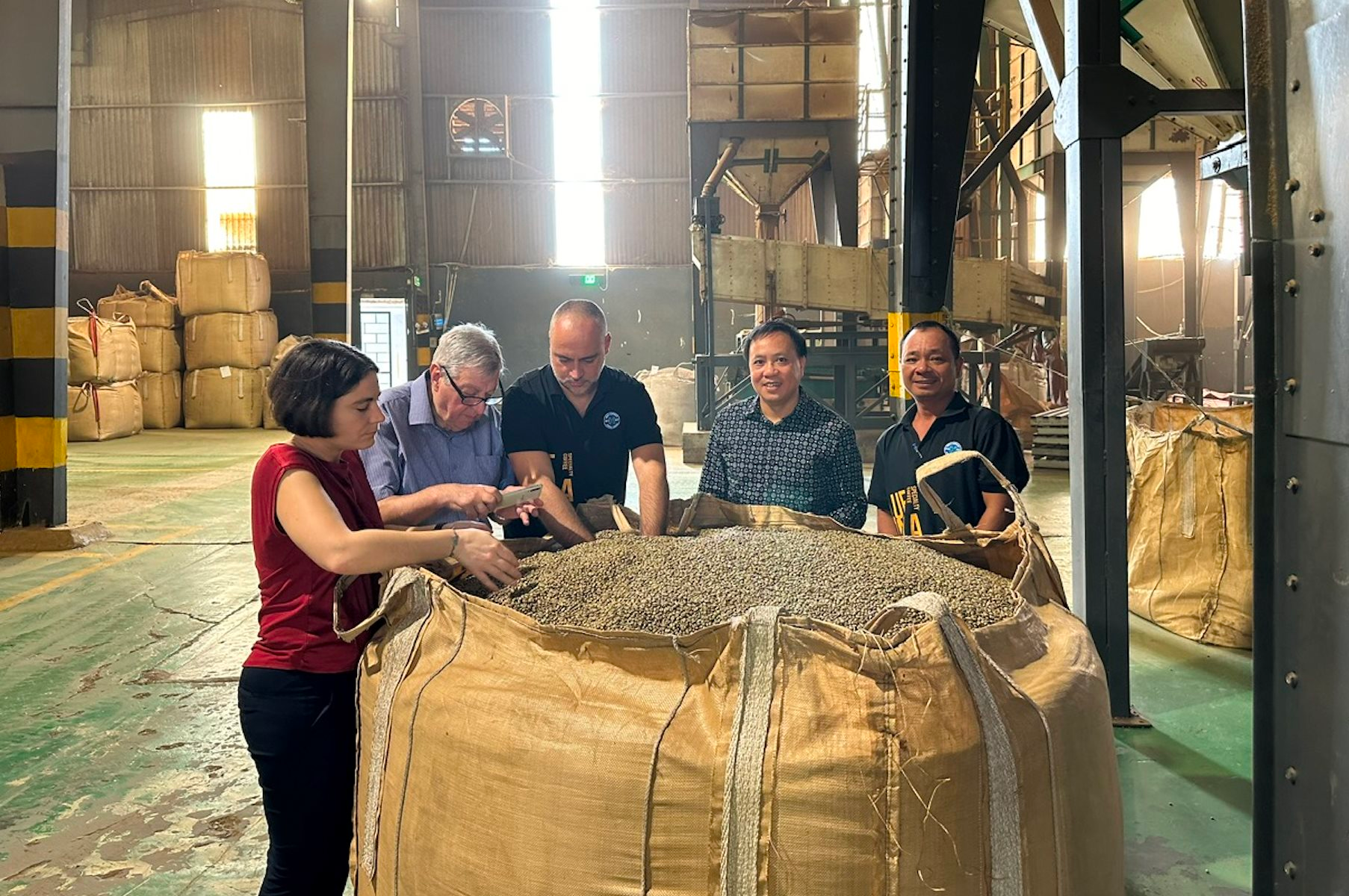As a company that has been exporting Vietnamese agricultural products to the US for 22 years, Mr. Phan Minh Thong – Chairman of Phuc Sinh Joint Stock Company – recently shared some noteworthy insights into this big market, especially in the context of the newly elevated Vietnam-US trade relationship.
Mr. Thong is known as the “Pepper King”. In recent years, Phuc Sinh has also been actively promoting the export of coffee to the international market, mainly in Europe. According to Mr. Thong, Phuc Sinh’s annual export volume has reached $300 million, of which coffee accounts for 60%, pepper 30%, and tea 10%.
Changes in the US
“The pandemic has prevented us from traveling abroad for 3 years, so as soon as the epidemic subsided, we immediately planned to visit customers and markets. Our first trip in 2023 was to the United States,” Mr. Thong began sharing.
The reason why he chose the US as the first destination is because it is a large and important market for the company. Before Covid-19, every year, the Phuc Sinh leadership always had a few trips to the US, and conversely, many companies that are customers of the company also visited Vietnam every year to assess the business situation. When the pandemic broke out, all two-way trips were stopped. Communication mainly took place via email, Skype, WhatsApp, etc. Therefore, when travel was allowed again, the Phuc Sinh delegation under Mr. Thong was very excited.
After arriving in the US, the first thing that caught Mr. Thong’s attention was that despite the explosion of technology during the pandemic due to its convenience, when entering the US, he noticed that unlike previous years when US customs used automated machines, this year they used a lot of personnel. “It seems that entering the US is becoming more and more strict,” Mr. Thong commented.
Another prominent issue under Phuc Sinh’s observation is that companies and factories have very few employees. “I don’t know where all the people went,” is the statement that many recruiters and managers say at this time. In addition, remote work is very popular in the US after the pandemic. The companies that Phuc Sinh met all had employees coming to the office 2 to 3 days a week, and the rest of the time, everyone worked remotely. Demand for goods and services has decreased significantly. Retail revenue for all main consumer goods, including luxury items, has decreased, and sometimes when going to shopping centers, you feel very empty, or sometimes there are more sellers than buyers.
“In clothing stores, we noticed that if in the past, one shop had a few staff members, then now, two or three shops or a large shop have only one person. You choose your clothes, go into the fitting room, and go out to pay by yourself. Machines are almost responsible for everything. When people cannot travel, companies maximize the use of machines to replace human workers, thereby creating a surplus of unemployed people,” Mr. Thong said.
He was also surprised by inflation in the US.
After more than 3 years, inflation in the US is very high. A bowl of pho costs $15-18, plus tips is $20, compared to Vietnam where breakfast in Saigon and Hanoi costs around VND 50,000 per meal, and in Hai Phong, a dish of banh cuon with full toppings costs VND 20,000 (food placed on another dish). The prices of breakfast in Vietnam have hardly increased compared to the world’s average growth rate.
Hotel prices after the pandemic also increased terribly. In San Diego, the Phuc Sinh delegation rented a room for $550 per night without bottled water or breakfast; if they wanted breakfast, they had to pay an additional $80 for 2 people. So, inflation in the US is very high, not as reported, not to mention that at restaurants, you are required to tip 18%, even Uber drivers require a minimum tip of 15%.

Photo: Customers at Phuc Sinh Factory in Binh Duong.
Economic recession leads to a significant reduction in demand
According to Phuc Sinh, this year, major customers have all announced that they will buy less and request slower delivery, even though the contracts have already been signed. Previously, when prices rose, large buyers of Phuc Sinh would sell to consumers. At this time, if Phuc Sinh makes late deliveries, there will be tremendous pressure, and customers will do everything they can to ensure that we have no choice but to deliver on time.
Conversely, when the economy is slow and difficult to sell, they send letters requesting not to deliver; or even let us know that if we deliver, they will have no money to pay; they request a delay of 2, 3, 4… months, even though I have already purchased enough stock.
“So, in business, you must understand both the buyer and the seller. If you don’t understand, it will be difficult for you to survive,” Chairman of Phuc Sinh said.
Doing business in the US is also very fast-paced. When the business cycle is running, companies have to run at full speed, and when it stops, we also have to quickly stop. Independent reports announced that consumer spending has slowed. According to Phuc Sinh, the situation is even more “terrifying”. The difficulty in the economy leads to a series of large companies laying off workers, even sometimes when they have just been hired but haven’t started working yet, they receive dismissal emails and their accounts are blocked…















